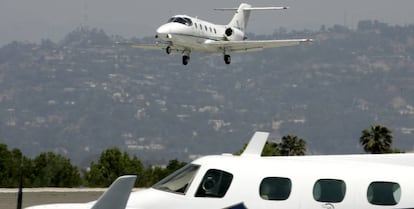What should we do about private jets?
The French Minister of Transportation’s proposal to restrict the use of private jets sparks debate on social media

If there’s a symbol of utmost luxury that very few can enjoy, it’s flying in a private plane. There’s no need to adapt to commercial airline schedules, or to wait to be served a meal, even if one’s traveling first class. Private jets allow you to leave Madrid in the afternoon to have dinner in Paris. They make it possible for political and business leaders to travel to multiple destinations in a few days without wasting time, unlike ordinary citizens, who must spend hours at airports. But these days, the use of private planes – long questioned for environmental reasons – is the subject of heated debate on social media, where some accounts monitor the private flights of certain millionaires and celebrities.
In recent weeks, a proposal by France’s Minister of Transportation, Clément Beaune, has fueled the debate in Europe. Beaune believes that the use of private aircraft should be limited and that restrictions on them should be considered throughout the European Union. His comment was made in the context of a plan for saving energy that the French government is finalizing for the coming winter. The proposal coincides with French Twitter accounts that have begun to monitor French billionaires’ flights, sparking public outrage, as people see that the wealthy’s planes emit carbon dioxide while everyone else faces gas and electricity consumption restrictions.
Twitter accounts like I fly Bernard, which was created in April 2022 and named for Bernard Arnault, the LVMH luxury group magnate, provide daily updates on billionaires’ private flights. “End of vacation for FH Pinault’s [François-Henri Pinault, one of the world’s richest businessmen] plane: return flight from Los Angeles to London, then from London to Paris, 46 tons of CO2,″ an August 26 tweet detailed. There are many similar accounts, not only in France, but also in the United States, where such accounts first started. Jack Sweeney’s account is among the most popular. Sweeney became famous for using bots to track the private planes of billionaires like Elon Musk (who recently flew nine minutes to travel about 34 miles), Jeff Bezos and Russian oligarchs.
C'est la fin des vacances pour l'avion de FH Pinault 😢
— I Fly Bernard (@i_fly_Bernard) August 26, 2022
Vol retour Los Angeles --> Londres, puis Londres --> Paris.
46 tonnes de CO2, ce n'est pas vraiment la fin de l'abondance non 🤔 ? pic.twitter.com/5u7G0nTygc
An information war dominates Twitter comments: how much do these jets emit? How much do companies in that sector pay for it....? “The largest private jet company has reported the equivalent of 1,430 times a French person’s annual carbon footprint, but... it has paid nothing to the (dysfunctional) emissions rights market,” Manon Aubry, a member of the European Parliament with the populist left-wing party La France Insoumise (Unbowed France), noted a few days ago. Private aircraft do not fall under the European Union’s Emissions Trading System, which currently applies only to commercial airlines.
“The rich will travel by jet to Qatar to watch soccer matches in air-conditioned stadiums and we will be asked to not take hot showers because the era of abundance is over,” one tweeter complained. Another Twitter user replied: “The World Cup won’t be played in air-conditioned stadiums because it’s been moved to December; it’ll be 25 degrees [Celsius; 77 degrees Fahrenheit] and air conditioning won’t be needed. Jets account for only 0.1% of emissions, less than cars and data centers!”
Other tweeters, whether politically inclined or not, are emphasizing the need to contextualize the problem. Even if private jets were banned, the impact on total aviation, a highly polluting industry, would be limited: they account for 4% of the sector’s emissions, which represented 2.4% of overall global emissions in 2018. These percentages may seem small, but if the aviation industry were a country, it would be the sixth most polluting nation in the world. In addition, those who travel by private jet (nearly 1% of the world’s population) generate 50% of the sector’s carbon emissions, according to Transport & Environment, a European group that promotes clean transportation.
The memes are out of control. https://t.co/F9FME6Dmmm
— Jack Sweeney (@JxckSweeney) July 31, 2022
Tu suscripción se está usando en otro dispositivo
¿Quieres añadir otro usuario a tu suscripción?
Si continúas leyendo en este dispositivo, no se podrá leer en el otro.
FlechaTu suscripción se está usando en otro dispositivo y solo puedes acceder a EL PAÍS desde un dispositivo a la vez.
Si quieres compartir tu cuenta, cambia tu suscripción a la modalidad Premium, así podrás añadir otro usuario. Cada uno accederá con su propia cuenta de email, lo que os permitirá personalizar vuestra experiencia en EL PAÍS.
¿Tienes una suscripción de empresa? Accede aquí para contratar más cuentas.
En el caso de no saber quién está usando tu cuenta, te recomendamos cambiar tu contraseña aquí.
Si decides continuar compartiendo tu cuenta, este mensaje se mostrará en tu dispositivo y en el de la otra persona que está usando tu cuenta de forma indefinida, afectando a tu experiencia de lectura. Puedes consultar aquí los términos y condiciones de la suscripción digital.









































